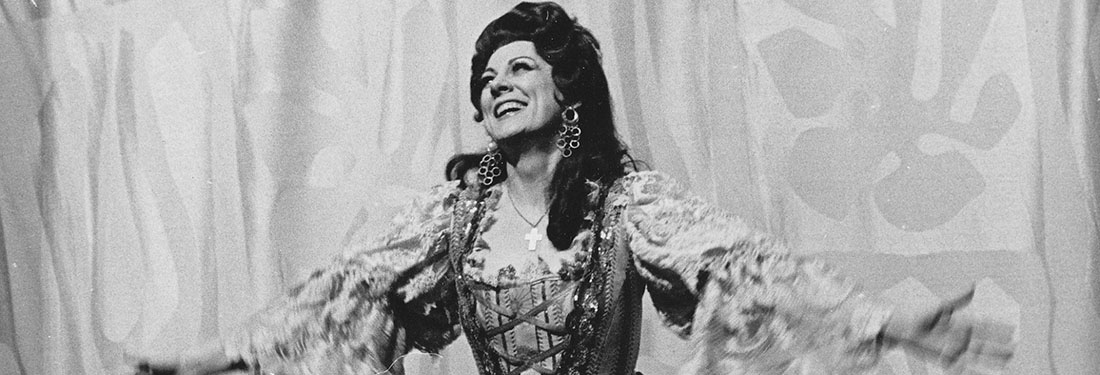
No one – not even La Divina – can sing Italian like Italians! It’s not just in her pronouncing the words correctly, but in molding them: where the accents go and how to use them. This becomes blatantly evident in Tebaldi’s Gioconda performances. She is innately Italian – stereotypically, even – for better or worse. Only Scotto can rival her in that respect (and only in that respect). In the Parterre comments regarding the recent “audience-favorite” historic broadcast of Ernani – and indeed it was historic – there was the start of a topic of “Verdi style” and someone posited, “just what is Verdi style?” There was no answer and I am certainly not going to define it here even if I could, but I’m very sure it would start with the ability to properly speak or sing Italian.
As with Callas and every other major Gioconda, it is the final tour-de-force scene that is most telling. And Tebaldi – those screams! those “mio Dio’s!” No other word for it but fabulous! Listen to how she uses the words and to the transition she makes at the end of the monologue when Enzo comes in and she says “Enzo … sei tu?” She’s been carrying on, getting hysterical, when she comes to a climax and almost screams “Enzo,” startled by his sudden appearance, followed by a half-second realization, and in her most caressing tones of love, says, “it’s you.” Only a great actress could pull that off so convincingly.
There is no substitution for pure greatness and this Tebaldi had in abundance. From the moment Tebaldi walked on stage and sang her first note, you couldn’t take your eyes off her. Without her trying, she dominated the stage. This is magnetism. And personality. You know you are in the presence of greatness. That’s why we forgive Corelli a lapse in taste, Tebaldi a strangled high note, Sutherland her mushy diction, Milanov an occasional hootiness. They had vocal gold in their throats, great charisma onstage, and the ability to excite an audience to frenzy.
On September 22, 1966, La Gioconda was the first familiar opera to be performed in the new Met, Antony and Cleopatra having actually opened the house a few days prior. For the most part it had a stellar cast: Tebaldi, Cvejic, Dunn, Corelli, MacNeil, and Siepi with Cleva conducting. This was the test for the acoustics and I recall critics saying that the Act III concertato at the new Met surpassed anything heard previously. Tebaldi was singing Gioconda for the first time in her illustrious career and she found it a perfect fit for her newly diminished vocal qualities and her newly found dramatic sensibilities.
Over two seasons, Tebaldi sang the role 32 times with the Met (including the tour) and then four times at the San Carlo in Naples. That’s a lot of Gioconda in a short time and it clearly took a toll on the voice. But Tebaldi was singing the role at the right time in her career – near the end with a fully mature voice … or what I referred to as her “truck driver” voice, where she put too much pressure on the voice and that ruined many of her late performances. And then there were the adventuresome high notes. Even in her early career, those notes above the staff could be worrisome and strident. Now she just cut them off. And I sorely missed them soaring out over the trio in the last act as Zinka used to do. Yet in that same trio, Gioconda’s repeat of the Rosary theme, Tebaldi was always able to resurrect the magic of her voice in its 1950s prime, the most beautiful of its kind, whether on the Decca recording or in the opera house. Even Paul Jackson in his history of the Met broadcasts marveled at that, though he detested Tebaldi’s overuse of chest. The fans loved it.
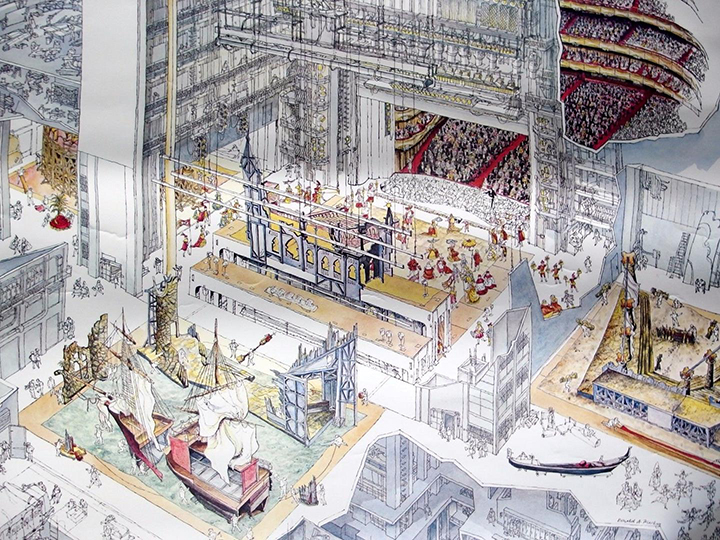
One of my favorite posters: backstage at the new Met during a Gioconda performance. One can pick out the sets for each of the acts on the new Met’s multiple stages. The poster originally appeared in the New York Times just before the new Met opened…
At last count, I have 14 recordings of Tebaldi singing the role over the 18 months she was singing it. Relax, I’m not going to go through each one! The second one, on October 10th, is vocally her best as there had been three weeks between the prima on 9/22 and the performance on 10/10; the pressure of opening was over and the voice well relaxed. Unfortunately, this performance was caught on a backstage mike and the stage manager interrupts every few moments … an ecstatic “Suicidio” destroyed just before the end by a call for places for the chorus.
The Met was in havoc those opening weeks of the new house trying to get all the new productions on the new stage. Performances were postponed, new productions delayed for months. Beni Montresor’s magical sets for Gioconda were so complicated that the set-ups during intermissions seemed endless and many of the performances went well passed midnight. Even Mr. Bing filled in as a stagehand! Again, it’s too bad about this 10/10 performance as of the six performances I have with both Tebaldi and Corelli, this had the best audio. Tebaldi and Corelli were an ideal match in everything they did together – Mr. and Ms. Opera – and Bing tried to schedule them together as much as possible. They were his biggest box office draw. Ideally one wants a performance with them both. He was scheduled for the first broadcast and cancelled; Bergonzi did the second. Corelli never recorded the role commercially, a shame as it was one of his best and he was the ideal Enzo … perhaps a bit of crude singing for perhaps a crude character.
Winthrop Sergeant wrote in The New Yorker, “When he sang out, there was that magnificent vocal organ that makes Corelli buffs swoon – a voice unequalled today, as far as I know, for power and brilliant edge. Just by way of swank, he began his ‘Cielo e mar’ with his back to the audience.” And then I was sitting in the company box (grand tier next to the proscenium) one evening; Milka Stojanovi? who was covering Tebaldi in the Gioconda’s was sitting next to me. We chatted … very nice. In the second act, Corelli got hopelessly lost during the “Cielo” and we looked at each other aghast. Even the great… Anyway, I promised to go to her one scheduled performance, and I did.
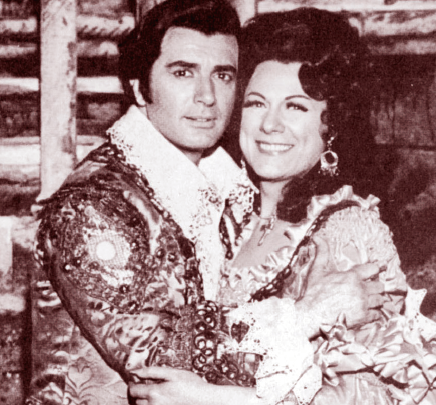
Mr. and Mrs. Opera
Other than the regular Met performances, Tebaldi sang Act II at the Richard Tucker Gala. There was also one performance in Philadelphia with Corelli. Highlights of it were released commercially (sort of) on one disc on the Bel Canto Society label. Of the Tebaldi-Corelli match-ups, this has the best sound though the complete performance can be found elsewhere online. The other two discs in the album were a complete performance with Mary Curtis Verna. These two performances and the 24 he did with the Met were his only performances of the role. This includes a terrific performance with Eileen Farrell that I’ll get to later.
Between the two Met seasons, Tebaldi returned to Italy for the first time since 1962 and sang four hugely successful performances at the San Carlo in Naples. The first of these was recorded and is probably her best all-round performance of the role. The Enzo is Renato Cioni and he sings like an Italian tenor – don’t ask – but it’s WOW! Even Anselmo Colzani gives his best. It is a truly exciting occasion.
Tebaldi’s partners at the Met included Cossotto, Elias, and Dunn, Corelli, Tucker, and Bergonzi, Milnes, MacNeil, and Colzani, Siepi and Hines. We’re not going to get that kind of casting anymore. We COULD have gotten it from Decca but we didn’t. I find that 1967 commercial recording is one of Tebaldi’s very considerably finest recordings. She is more dramatically alert than anything she ever did or was to do. It’s a particular favorite recording of mine, despite some great casting that doesn’t work. Didn’t Decca have a major mezzo at that time besides Marilyn Horne? Horne simply has the wrong sound. I’m going to take a wild guess here… Horne was a huge Tebaldi fan (as any sane person would be). She has said she was very good at imitating voices and started her career singing like her idol. I’m guessing that Jackie begged to make a recording with her. It’s not that Horne is bad, in fact she is quite good and involved, but just not the right voice, great as it is.
Carlo Bergonzi and Tebaldi made several classic recordings together – Aïda, Bohème, Butterfly. As Enzo, he was much better in the Met broadcast; dramatically the best that can be said is he is subtle. But, he sings beautifully. Robert Merrill – what happened to him? In the Milanov 1959 broadcast, I said he was my favorite Barnaba. Here he is immobile – his roar at the end comes out as a grunt like as in “Meh.” The wrong Nicolai was used. I’m thinking that some incompetent secretary at Decca was told to get in touch with Nicolai Ghiaurov and didn’t pay close attention and got Nicolai Guiselev, not Nicolai Ghiaurov. Oralia Dominguez is an excellent Cieca. Lambeto Gardelli conducts as he knows what he’s doing. Despite all the negatives, most critics agree, as do I, that this is the best Gioconda studio recording. It is also the first recording to include all, rather both the cuts … a total of maybe 90 seconds.
- 10-18-66 – Philadelphia Lyric (highlights): Guadagno; TEBALDI, Dunn, Chookasian, CORELLI, COLZANI, Hecht
- 4-15-67 – MET Broadcast – Cleva; TEBALDI, Elias, Baldani, Morell, MacNeil, SIEPI (last)
- 1967 – Decca; Santa Cecilia; GARDELLI; TEBALDI, HORNE, DOMINGUEZ, BERGONZI, Merrill, Guiselev
- 12-30-67 – San Carlo (return to Italy) – Naples: Gardelli; TEBALDI, Mattiucci, Lago, Cioni, COLZANI, Washington
- 3-2-68 – MET Broadcast – Cleva; TEBALDI (last), COSSOTTO, DUNN, BERGONZI, MACNEIL, Giaiotti
Before we leave Mme. Tebaldi, there are two classic moments that should be heard and/or seen by all opera lovers. The first is from a concert at the Chicago Lyric Opera on November 10, 1956 conducted by Sir Georg Solti, the Act II duet with Renata Tebaldi and Giulietta Simionato. This is what opera is all about!
The other must-see is a video. On New Years Day 1967 (what a way to start the year!) The Bell Telephone Hour presented The First Ladies of Opera (a different set of First Ladies than those mentioned above other than Tebaldi). The program is classic – a must-see! The four divas are (in alphabetical order) Birgit Nilsson, Leontyne Price, Joan Sutherland, and Renata Tebaldi. Each sang two arias interspersed with a brief interview with the conductor Donald Voorees. Tebaldi concluded the program (and wiped them all up!) with “Suicidio.”
We’ll conclude our Gioconda survey with a look at some other notable recordings.
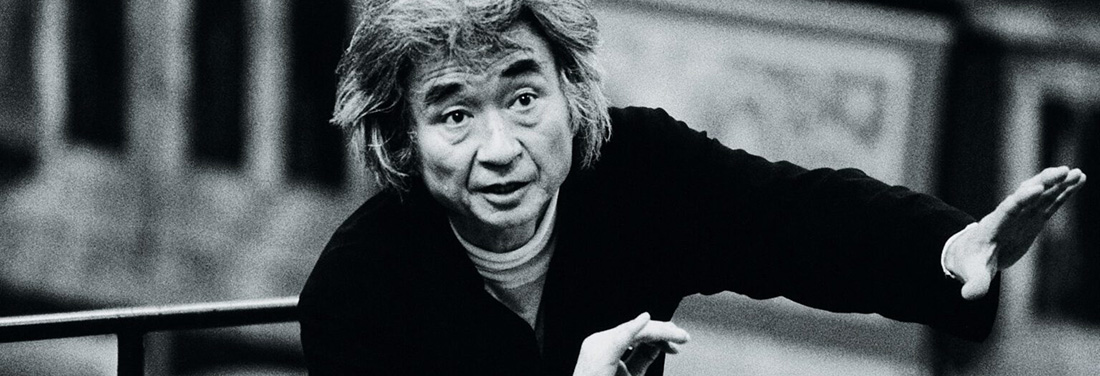
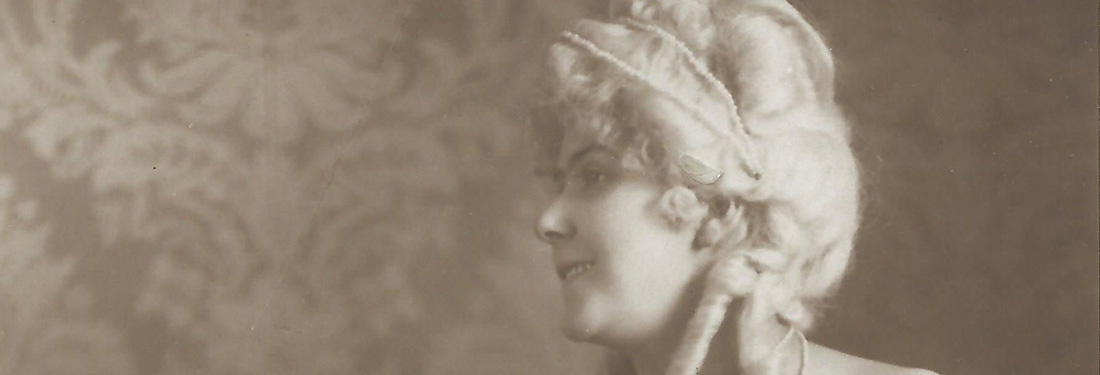
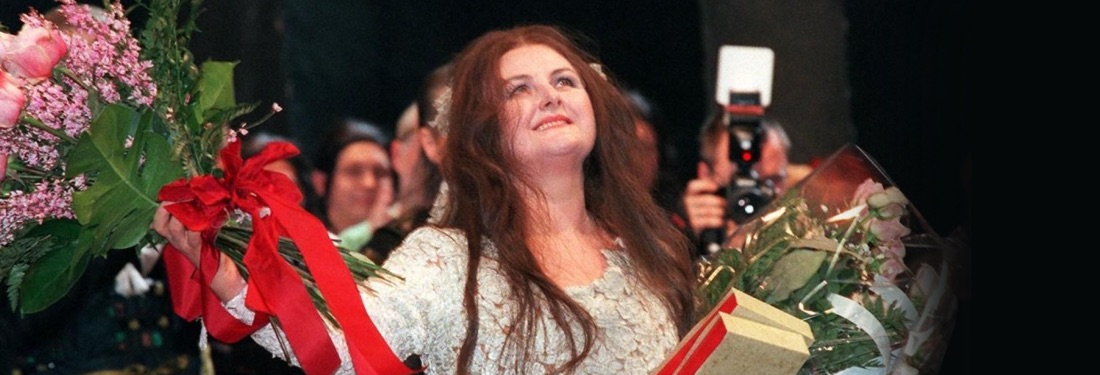
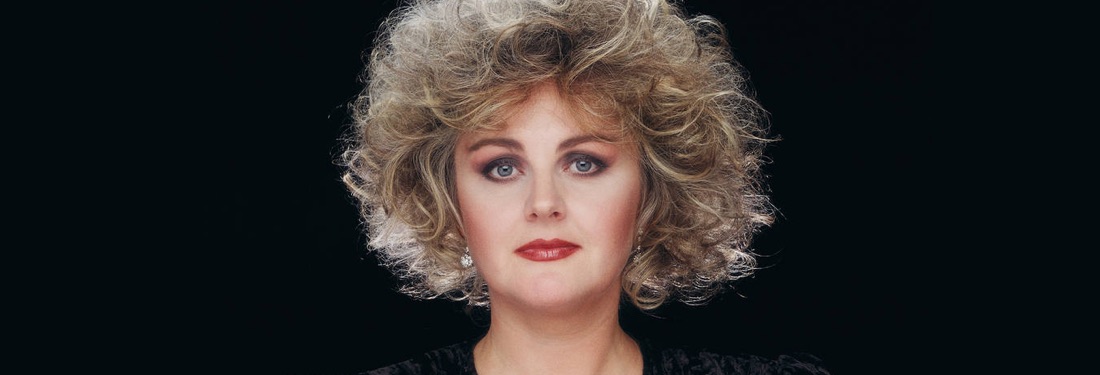

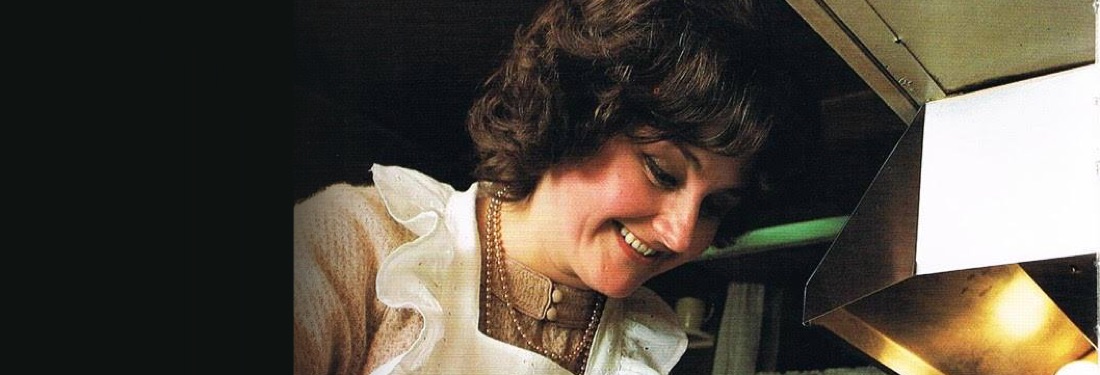
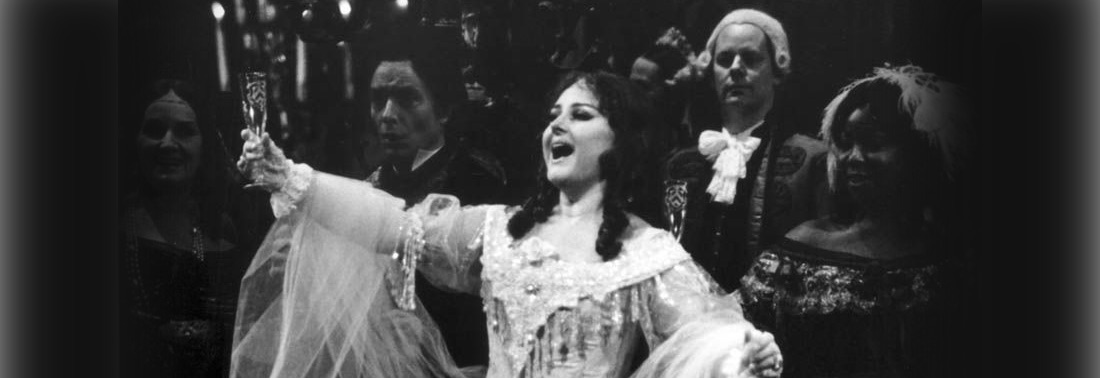
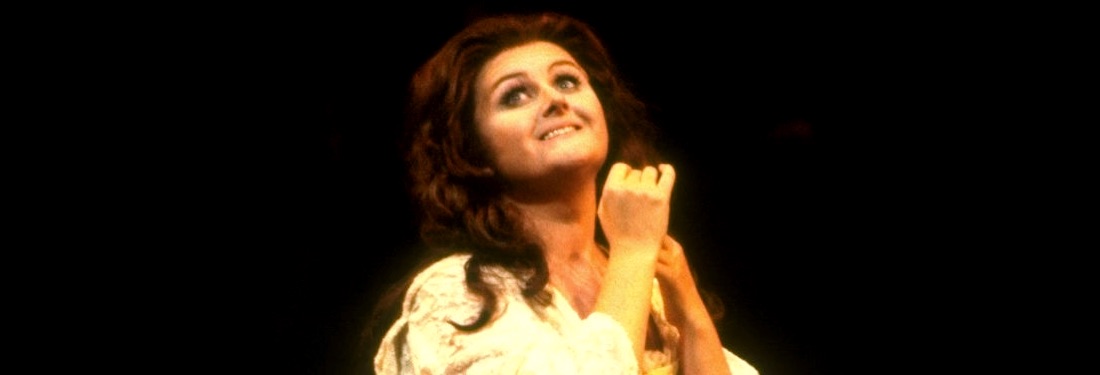

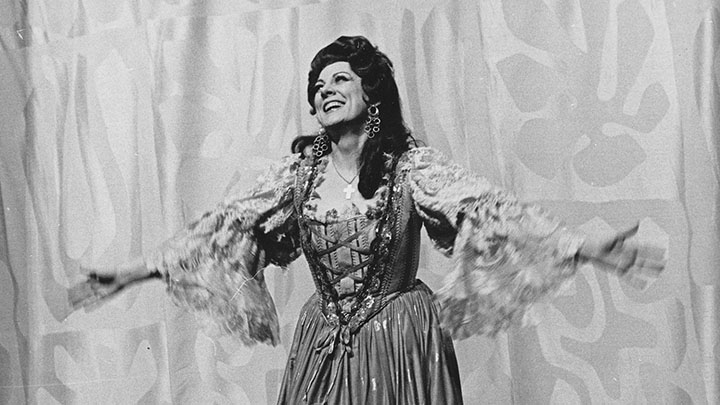
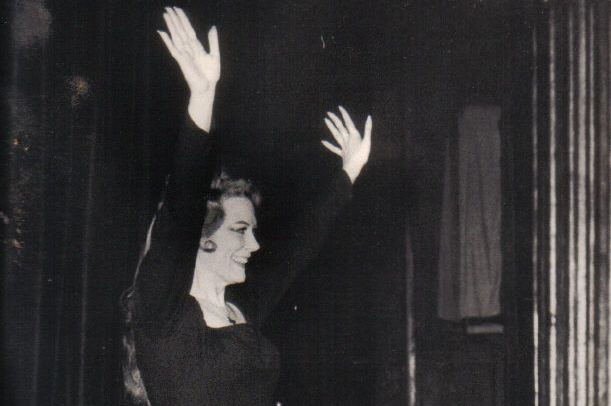

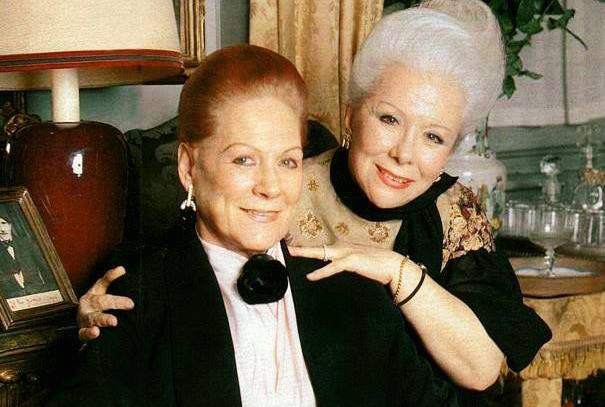







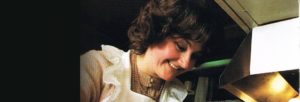



Comments